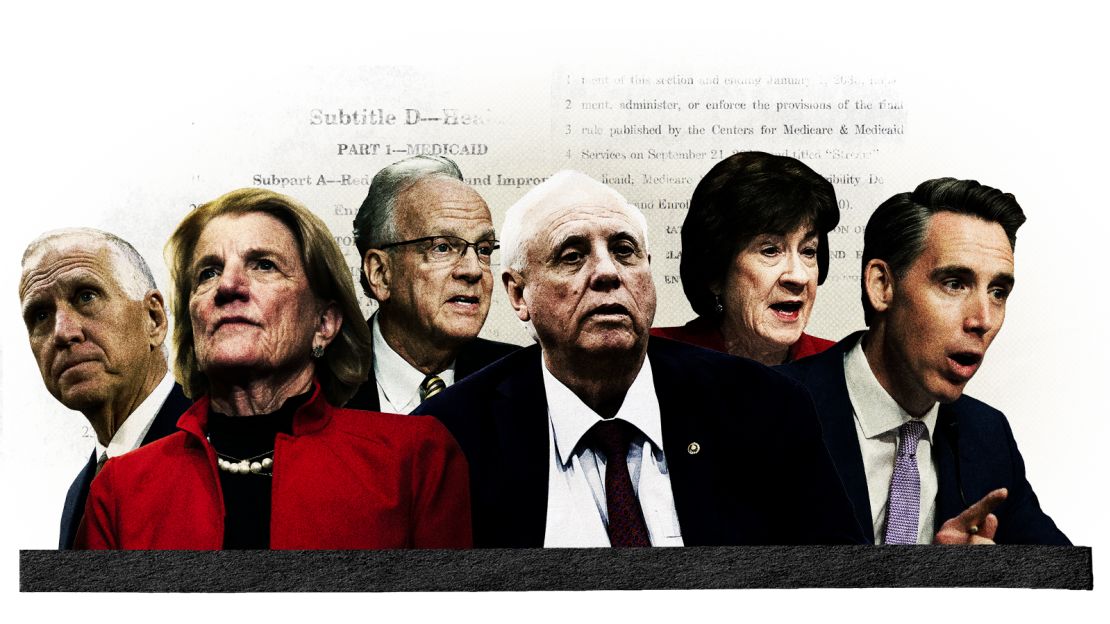CNN
—
Republicans have set an ambitious deadline of trying to pass President Donald Trump’s sweeping agenda through Congress by the fourth of July, kickstarting an intensive negotiation in the US Senate where Republican lawmakers are all over the map when it comes to the specific changes they want to see made to the House-passed bill.
The challenge ahead for Senate Majority Leader John Thune is he can only afford to lose three votes, but he must find consensus between conservatives in his conference who are pushing for more spending cuts and others who already fear that some of the cuts to Medicaid and rollbacks to clean energy tax credits that were a cornerstone of the House bill went too far.
It’s a herculean task and one made more complicated by Elon Musk publicly blasting the House bill. Adding to the challenge is the fact that whatever the Senate settles on will need to go back to the House and win approval there before the President can sign it and pass it into law.
Here are senators describing in their own words their concerns and what they want to see changed in the weeks ahead. The interviews were conducted in the first week in June after lawmakers returned from recess. The transcripts below have been lightly edited for clarity.

Why it matters: New work requirements for Medicaid and changes to how states can levy provider taxes made up a significant amount of the ways to save money in the House bill. Speeding up how quickly those work requirements were implemented also went a long way to secure support from the conservative House Freedom Caucus. Yet a handful of GOP senators say they need to look closely at how the changes could affect their states and their constituents. And some Republicans in the Senate are warning that the changes may need to be scaled back, a potential problem for House conservatives.
“I’m concerned about people who are here legally, residents of my state, citizens of my state who are working and would lose health care coverage. I am not going to vote for that … There are a host of concerns but Medicaid is the big kahuna and that is where I am training my focus and my fire. I’ve got 1.3 million Missourians on Medicaid, or CHIP, so that’s the hill to fight on.”
CNN: “Do you have concerns about the changes to the provider tax on the Medicaid side?”
Justice: “The provider tax is really important. I mean, you know, to to a lot of states, you know that we, we, we can’t let that just get undermined, because you get that undermined and everything you can hurt a lot of our nursing homes a lot.”
Reporter: “My follow up question is does the House bill cut Medicaid to the bone? When you say that, are you worried that they’re gonna have bigger cuts are you fine with the House as it is?”
Justice: “I do not think it cuts it to the bone, or any of the bone, but but there’s, you know, you get you gotta get through all the fine print and everything, because there could be things that absolutely hurt people and everything.”
Sen. Susan Collins of Maine:
“I’m still going through the issues that I see as problematic. I’m looking at the changes in education programs like Pell grants. I’ve told you many times that I’m looking at the impact on rural hospitals. I support the work requirements that are in the bill. I think that makes sense.”
“There is a lot of concern. I did a couple roundtables at home, and so, you know, we talked about it, where I can look and see more deeply. There were some nuances to it that I hadn’t actually understood before that are in the House bill. We haven’t had a chance to digest how it’s going to impact our hospitals.”
“I’ve said before that I want to see very – I want to make sure that we’re not harming hospitals that we just spent COVID money to save. So, that’s part of it, but I also care a lot about, with disabilities and so, Medicaid is an important issue. So, we’ll see how, what the Senate does and I’ll be lobbying to try to get something that’s acceptable to me.”
“We have to take a look at states that have expanded Medicaid, to make sure that we’re making a smart decision for millions of people who are under expansion – North Carolina, 620,000 Medicaid recipients alone. So, we’ve got to work on getting that right, giving the state legislatures and others a chance to react to it, make a recommendation, or make a change. And that’s all the implementation stuff that we’re beginning to talk about now that we’re in possession of the bill.”

Concerns about the deficit and government spending
Why it matters: In the Senate, a handful of lawmakers have made clear they don’t think the House bill does enough to curb the country’s spending problems. The argument was bolstered this week by two things. First, Musk attacked members for backing the bill he argued didn’t go far enough. Then, the Congressional Budget Office released a report that they anticipated the bill in its totality would increase the country’s deficit by $2.4 trillion over the next 10 years.
The challenge here is that finding additional cuts that 51 senators can support and 218 House Republicans can sign off on is tough to do. Some of the largest savings that could have been made to programs like Medicaid were rejected in the House already by swing district Republicans who argued that the cuts could harm their constituents.
Johnson: “I talked to the President today… he’s encouraged me to support the bill and I said – listen, we all want him to succeed but my bottom line is we need to seriously address the debt and deficit issue.”
CNN: “Would you be open to passing something close to the House bill now with a promise of changes in the future?”
Johnson: “Listen, I want to help the president succeed in this thing so I’ve got a pretty open mind. My requirement has always been a commitment to a reasonable pre-pandemic level of spending and a process to achieve and maintain it.”
Sen. Rand Paul of Kentucky:
“Come the end of September, when our fiscal year ends, the deficit’s going to be $2.2 trillion. That’s just not conservative. They’re borrowing $5 trillion, that means they’re anticipating the following year being over $2 trillion as well, so it’s just not a conservative thing to do, and I’ve told them I can’t support the bill if they’re together. If they were to separate out and take the debt ceiling off that, I very much could consider the rest of the bill.”
Curtis: “If you look at the House bill, just to simplify it a little bit, we’re going to spend in the next 10 years about $20 trillion more than the revenue we bring in, and they’re cutting $1.5 trillion out of $20 trillion. Most of us wouldn’t do that in our businesses, in our homes, and certainly don’t do it in the state of Utah. And so that’s a big concern to me.”
CNN: “So any substantial changes to get your support?”
Curtis: “I’m not drawing red lines, right, like I’m being careful. But I think we have to do our best work to get my support.”

Why it matters: At the end of the House’s precarious negotiations, members of the House Freedom caucus got assurances that many of the clean energy tax credits that were part of former President Joe Biden’s legacy would be rolled back and that the process for ending them would begin sooner than the original legislative text had laid out. It was a huge victory for conservatives. But, in the Senate, a handful of lawmakers are worried that the rollbacks could affect projects in their states that create jobs and income for their constituents.
“On the energy tax credits – as you know, obviously a great deal of focus on oil and natural gas in the state, but also on the clean energy side as well.”
“I’ve made clear that I think these investments that we have made as a country in some of these clean energy technologies, we’re seeing that play forward in a lot of states, and so let’s be smart about these, let’s make sure if you’re going to do phase-outs of this, that they’re reasonable phase-outs. So I’m going to be advocating for that.”
“We’re going to pay attention to how it affects Kansas. One of the issues is I think there is a lot of Senate sentiment that it’s too rapid.”
“Look, the key there is to go at it through the lens of a businessperson. It’s easy, you know, from a political standpoint, to cancel programs that are out there. We need to be smart about where capital has been deployed to minimize the impact on the message we’re sending –that we’d send businesses, that every two or four years we have massive changes in our priorities for energy transition. We just got to get it right. It doesn’t mean that I think we have to extend every program, necessarily, but I do think we have to hold businesses harmless for the programs that are there, and then calculate what the economic effect is going to be. If we don’t – this is not all their spending, there’s economic growth behind a lot of these as well, as we’ve seen in North Carolina.”

Concerns about state and local tax deductions
Why it matters: A group of New York and California Republicans fought hard in the House to increase how much in state and local taxes constituents can deduct on their federal returns. The deduction cap went from $10,000 to $40,000 for people who fall below a certain income threshold, but the benefit really helps voters in high-tax states. In the House, Speaker Mike Johnson’s majority is built on winning some of these high-tax districts. And several members in his conference made it clear they’d vote against the bill without a boost to SALT. In the Senate, the politics are very different.
The provision is costly and there aren’t any Republican senators representing high-tax states like New York, California, New Jersey or Illinois. Therefore, there is a lot of grumbling from GOP senators who would rather spend the billions it costs to raise the threshold on another area of the tax code.
“There’s not a single senator from New York or New Jersey or California and so there’s not a strong mood in the Senate Republican caucus right now to do $353 billion for states that basically the other states subsidize. But that being said, you know, like I say on every issue, nothing is resolved until it’s resolved and we are working things out.”
CNN: “Is there any way the $40,000 cap survives?”
Tillis: “I hope not. But, you know, I’ll have to that is one where I don’t. I believe when I draw a red line, I stick to it. I’m not willing to draw a red line there, but I would be a lot happier, in total, I’d be a lot happier seeing that number come down. I’ve said it before. It’s because it’s personal to me. I took all the criticism for making North Carolina not a SALT state, and now you’re telling me I’ve got to subsidize the bad decisions made in Albany and Sacramento. So it’s at the end of the day, if they do their work in their state, they should be talking to state senators, not US senators, to fix that problem.”
CNN’s Ted Barrett, Alberto Mier, Rebecca Wright, Curt Merrill, Dan Dzula, Matt Dempsey, Jesse Remedios, Graelyn Brashear and Dan Bloom contributed to this report.

